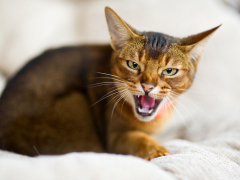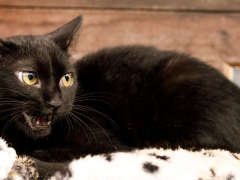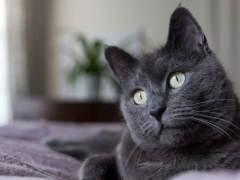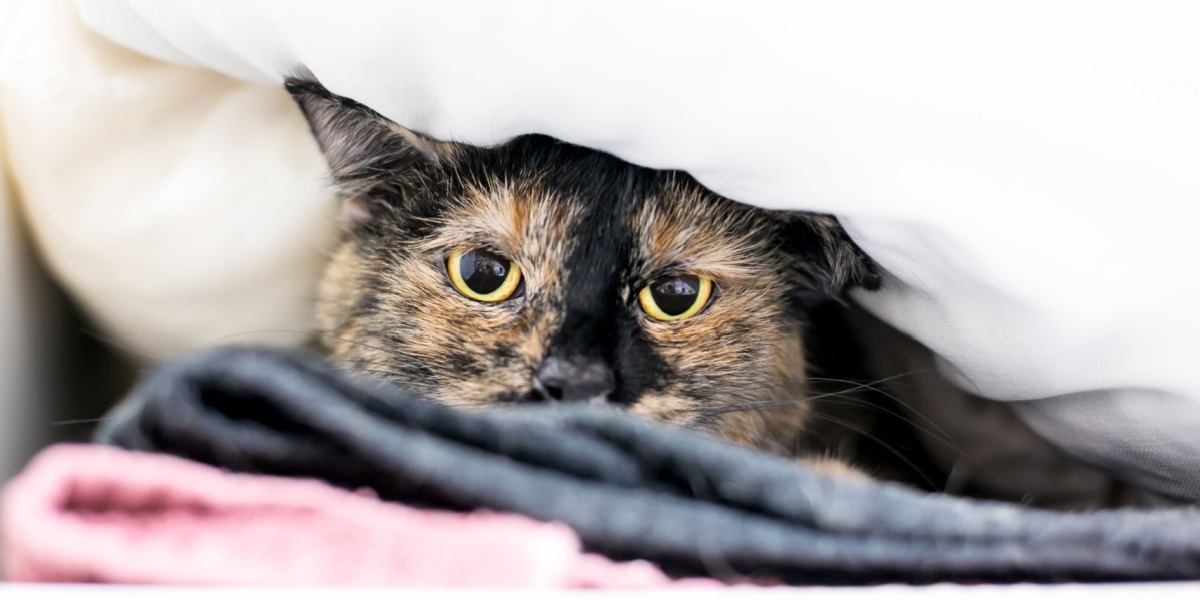
Most people have heard the term “scaredy-cat.” Some cats are naturally shy and timid and will be frightened more easily. Others might be calmer and more confident but will still have skittish moments.
Quick Overview
Cats can become skittish due to pain and injury, medical conditions, old age, and changes in their environment and routine.
It’s important not to assume that skittishness is simply a behavioral issue as many medical issues can cause cats to react with fear or hiding away.
Understanding why your cat has become skittish allows you to make positive changes to improve their well-being.
If you have noticed your cat has suddenly become more skittish, you are probably wondering why that is so and what you can do about it. Read on to find out more about some of the reasons behind this change in behavior.
1. Sudden Fright
Your cat might become skittish all of a sudden due to a sudden fright. This is one of the more obvious answers. An unexpected or loud noise, such as the slam of a door or a cup dropping on the floor, can scare your cat.
Most cats will recover quickly from this. An already anxious cat might be frightened by any sudden movements toward them, like your hand reaching out to stroke them. If they have had negative experiences in the past, they are more likely to respond in panic.
2. Pain or Injury
Cats are both predator and prey animals. When they are injured or in pain, this puts them in a vulnerable position. In order to protect themselves and keep themselves safe, their “flight” instinct will kick in. They will run away and resist any social interaction by hiding.
If your cat is seeking out areas away from people and other pets in the house, keep an eye out for other signs of pain and discomfort. You can try and check them over for any signs of obvious injury if they allow it.
Be careful as they might lash out if being touched increases their pain or if they anticipate pain. If you are concerned, reach out to your veterinarian as signs of pain in cats can be subtle.
3. Illness or Disease
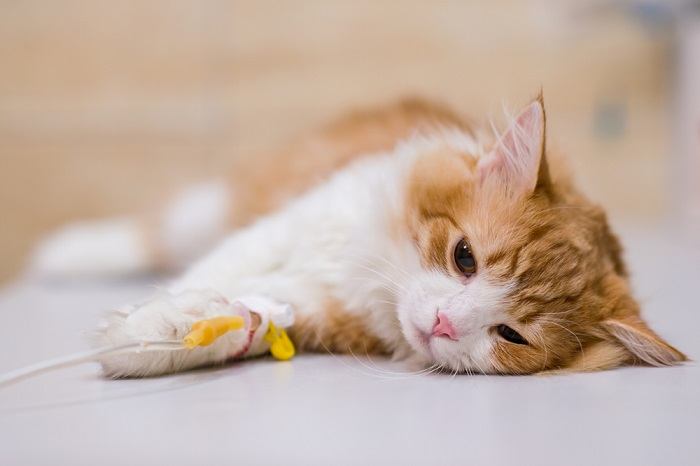
Illness can make cats act very differently than they usually do.
As with pain or injures, cats can become more anxious and irritable if they are unwell from any underlying health issue. In addition to increased skittishness, other behavioral changes that you might see in a sick cat include:
- Inappropriate peeing and pooping outside of their litter box
- Over-grooming
- Increased conflict with other cats or pets in the house
If you see these signs in your cat, it is best not to assume that your cat only has behavioral issues. A visit to your veterinarian is important for ruling out medical causes.
4. Changes in Their Environment
Cats can be incredibly particular animals. They prefer to stick to the same routine and habits and can become stressed by any changes.
If you have moved to a new home, your cat will need time to adjust to their new environment. Consider allowing them access to only one room initially. Once their confidence has grown, you can increase the space accessible to them.
Cats can also be affected by changes in the house that we might not expect them to be bothered by. Perhaps you’ve rearranged the furniture in your living room or you’ve moved their litter box to a different room in the house.
If things don’t go the way that your cat is used to, this can lead to a buildup of stress and anxiety. If your cat has become more skittish, think of any changes that have occurred. Keep in mind that something “minor” in our eyes can have a big impact on your cat.
5. New Pet in the House
Perhaps you’ve brought a new pet home and tried to make some introductions. Be it a new cat or a dog, it is normal if your cat does not warm to their new companion straight away.
Cats are territorial animals and might feel threatened if a new pet enters their “turf.” It will take time and patience to establish good relations between them so that your cat becomes more settled and comfortable.
6. New People in the House
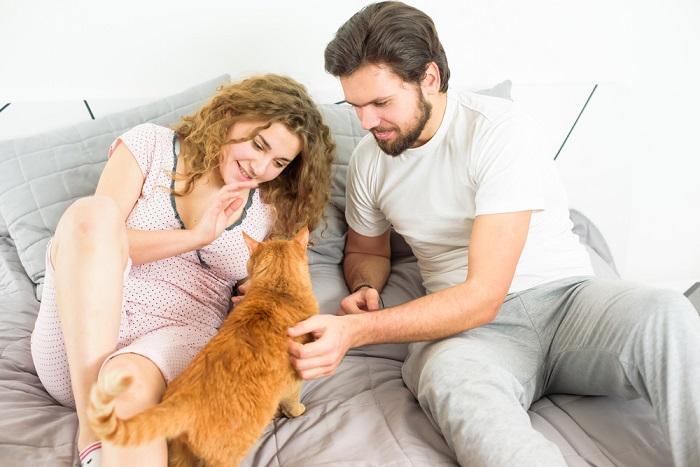
New people in the house can make cats feel nervous, especially if they are already shy.
If you have guests at the house who are coming for a short visit or are staying for an extended time, this can be overwhelming for some cats. It is especially stressful for shy cats—they need more time to become familiar with new people.
Give your cat plenty of space. Instead of forcing interaction on them, allow them the space to engage when they feel comfortable doing so.
7. New Baby in the House
Having a newborn baby in the house can be stressful for your cat as they have to get used to all the new sights, sounds, and smells. A baby’s cries and screams can frighten cats and send them fleeing in the other direction.
To help ease your cat’s anxiety, try to follow their normal routine as much as possible and provide plenty of safe and quiet resting or hiding places. And finally, make sure to devote as much time as you can to interacting and playing with your cat so that they are still getting your attention.
8. Old Age
Unfortunately, as cats get older, we inevitably see a decline in their general health. Common medical conditions in senior cats are hyperthyroidism, chronic renal disease, diabetes, and osteoarthritis. These lead to increased stress and anxiety, which can make them skittish. It’s especially important to keep up with annual wellness checks with your veterinarian as your cat ages for early detection of health problems.
Your older cat’s vision and hearing may also deteriorate, which can result in them startling more easily even if they weren’t a particularly skittish cat previously. You can help them by keeping the furniture in the same place and minimizing loud noises. Avoid making sudden movements around them, especially if you are close to them but they haven’t yet noticed your presence.
Old cats can also get cognitive dysfunction syndrome, which you might have heard of as feline dementia. This causes a decline in their cognitive abilities, affecting their awareness, memory, and responsiveness. It can result in increased anxiety and restlessness, so you might notice your older cat becoming more skittish. Other signs of cognitive dysfunction are:
- Excessive vocalization
- Decreased appetite
- Increased appetite (they might forget they have already eaten)
- Changes in sleeping pattern
- Confusion
- Wandering around aimlessly
Final Thoughts
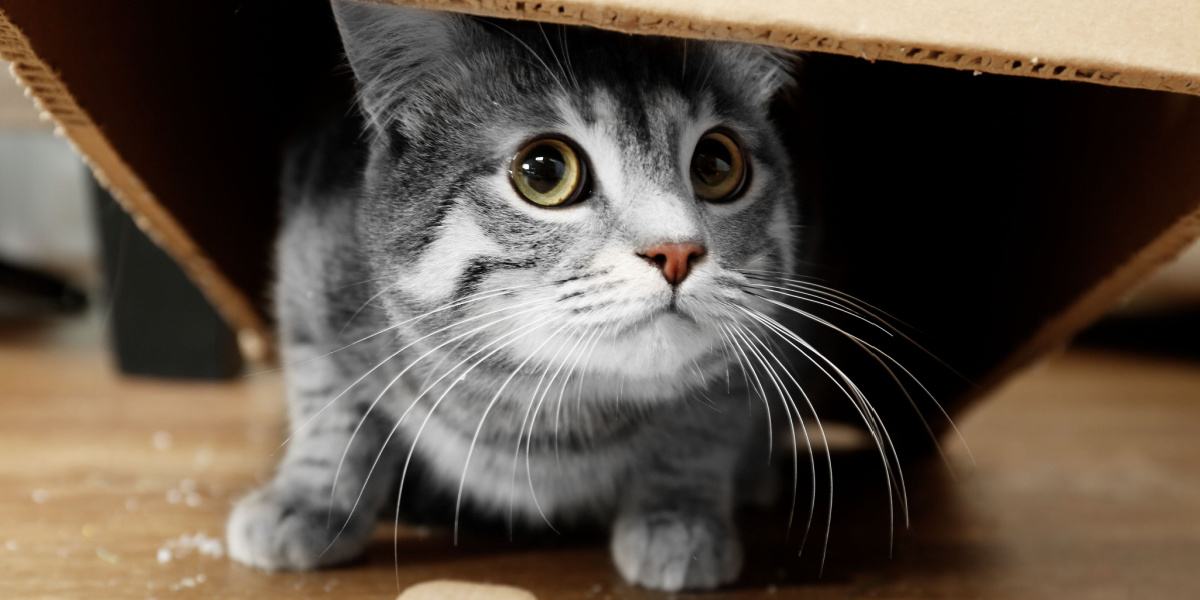
Understanding the cause of your cat’s skittish behavior can help you resolve anything that might be bothering them.
As you now know, there are many reasons why your cat might have become skittish all of a sudden. It is perfectly normal for your cat to be startled by a sudden fright and they will soon recover from it.
However, if your cat is becoming more fearful, then it’s important to consider if something more is going on. Your veterinarian will be able to check for any pain, injury, or illness. If these are ruled out, then consideration should be given to your cat’s environment and routine.
By understanding the stressors that have an impact on your cat’s day-to-day life, you can minimize or eliminate these to improve their overall well-being.
Also Read: 8 Ways To Help a Scared and Fearful Cat Be Confident
Frequently Asked Questions
Why is my cat getting more skittish?
There are many reasons why a cat might be becoming more skittish. The most important causes to rule out would be pain, injury, and disease. If your cat is sick and feeling unwell, this can result in stress, anxiety, and irritability.
If your veterinarian has ruled out medical conditions, then consider if there have been any changes in your cat’s environment and routine. Cats are sensitive creatures and changes that we might think are minor, like furniture being moved, can make them fearful and anxious. Once you have identified potential stressors, you can find ways to minimize or get rid of them.
How do you tell if a cat is traumatized?
Previous traumatic experiences and mistreatment can result in chronic stress and fearful behavior. A cat that is suffering from chronic stress will show more frequent and exaggerated fear responses. They might spend most of their time hiding away and appear more tense and vigilant. They might have lowered head and body posture, with all feet touching the ground, ears flattened and tail tucked in close. They will be less inclined to interact and play.
Will my cat ever stop being skittish?
If your cat is usually happy and confident but has suddenly become skittish, first rule out pain, injury, and disease. Also identify and manage any changes in their environment and routine to restore your cat’s contentment and confidence.
Fearful cats that have always had skittish personalities will require longer-term management. Minimizing triggers and stressors are key to reducing their anxiety. Using pheromones in sprays or diffusers is great for promoting calm.
More severe cases might benefit from trialing anxiety medications, as guided by a veterinarian. There is no guarantee your cat will stop being skittish entirely, but you can take steps to minimize it.
-
Atkinson, T. (2018). Practical Feline Behaviour. Oxfordshire, UK: CAB International

